What Video Marketers Should Know in 2022, According to Wyzowl Research
It’s well established that video has been one of the breakout trends in the marketing world for the past decade.
But what’s happening in video marketing right now? And how does its growth and success stand up to the twists and turns of a global pandemic?
At Wyzowl, we’ve released an annual State of Video Marketing survey every year since 2015, charting usage, spend, channels, and opinions among video marketers and consumers.
We recently released our eighth State of Video Marketing report and, in light of the chaos of recent years, it’s perhaps our most fascinating set of findings yet.
Our research suggests:
- Video remains a key priority for marketers with usage and spend both, overall, increasing in 2021, and plans to increase again in the next 12 months.
- The pandemic continues to impact video marketing plans — but the disruption appears to be reduced compared to last year, as people adjust to a ‘new normal.’
- People are watching more video online than ever before – in fact the amount of online video they watch has almost doubled since 2018.
- Marketers feel more positive about the return on investment offered by video than ever, as it continues to strongly influence traffic, leads, sales, and audience understanding.
- Consumers continue to use video as an integral part of their journey with brands, and are excited to see even more video content in the year ahead.
About the Survey
Wyzowl’s State of Video Marketing Survey is an annual report, now in its eighth iteration. Every year, we ask a range of questions — many of them the same from year-to-year — to evaluate how the video marketing landscape is changing and growing.
This time around, our survey was taken by a sample of 582 unique respondents (only around 7% of whom were Wyzowl customers) consisting of professional marketers and consumers.
The key findings …
86% of businesses use video as a marketing tool, holding steady from last year.
This is the high point in a general story of video usage growing which can be traced back to 2016 (the first time we asked this particular question in this way).
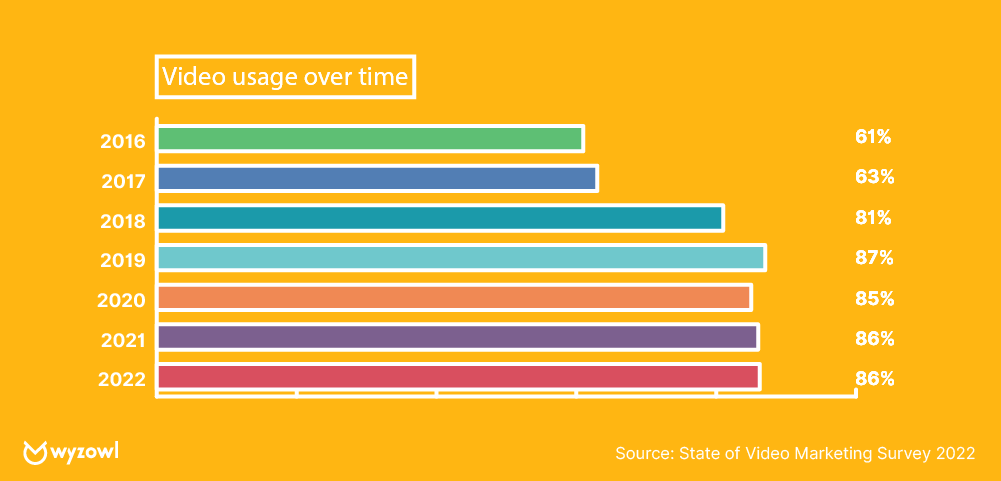
Also, 92% of marketers who use video say that it’s an important part of their marketing strategy.
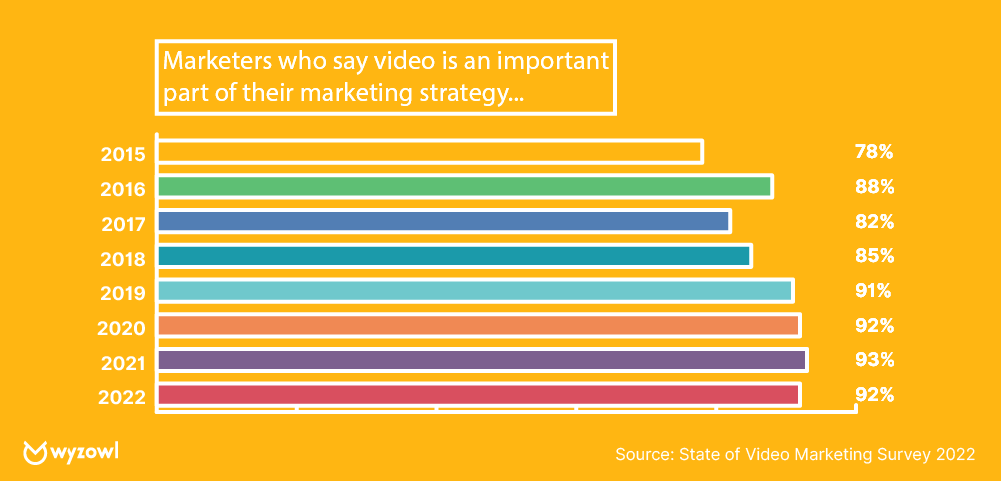 Perhaps most strikingly, 87% of video marketers reported that video gives them a positive ROI — a world away from the lowly 33% who felt that way in 2015. This could well be attributed to greater understanding of how to use video, as well as how to track and quantify its impact.
Perhaps most strikingly, 87% of video marketers reported that video gives them a positive ROI — a world away from the lowly 33% who felt that way in 2015. This could well be attributed to greater understanding of how to use video, as well as how to track and quantify its impact.
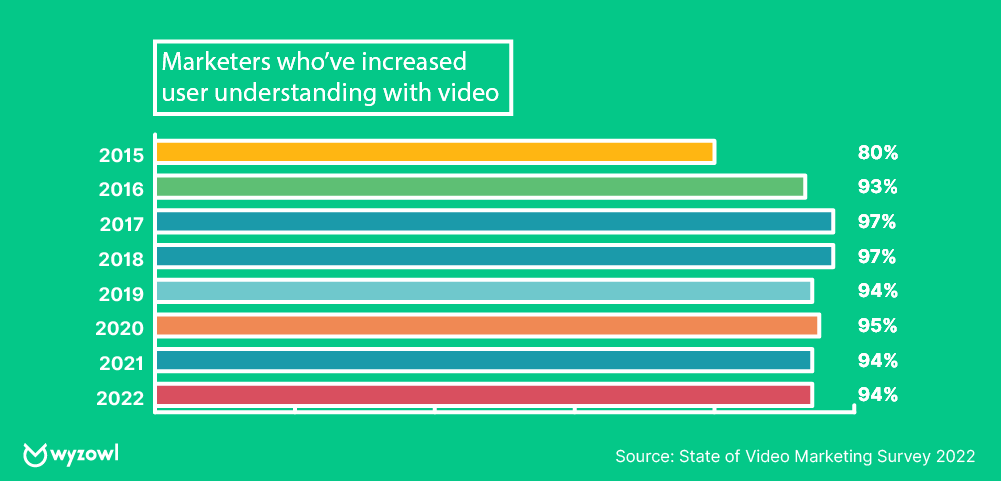 Most marketers feel that video is a brilliant investment for lead generation. 86% of video marketers say video has been effective for generating leads, up another 2% from 2021 and up 5% since 2019.
Most marketers feel that video is a brilliant investment for lead generation. 86% of video marketers say video has been effective for generating leads, up another 2% from 2021 and up 5% since 2019.
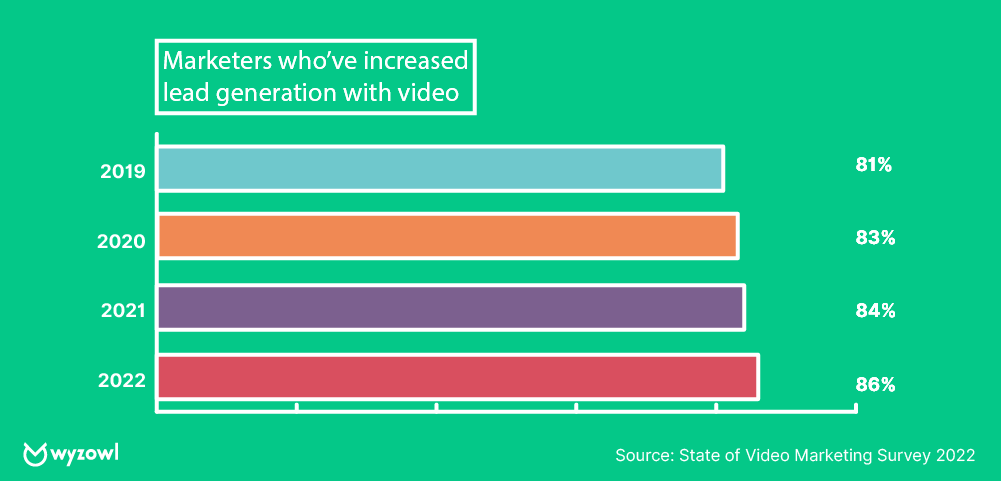 81% of marketers feel that video has a direct, positive impact on sales.
81% of marketers feel that video has a direct, positive impact on sales.
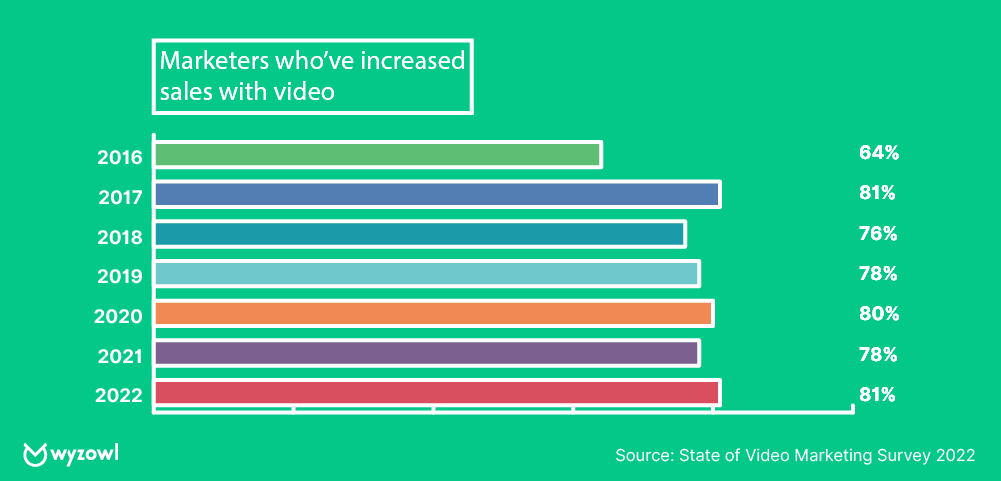 94% of marketers agree that videos have helped increase user understanding of their product or service.
94% of marketers agree that videos have helped increase user understanding of their product or service.
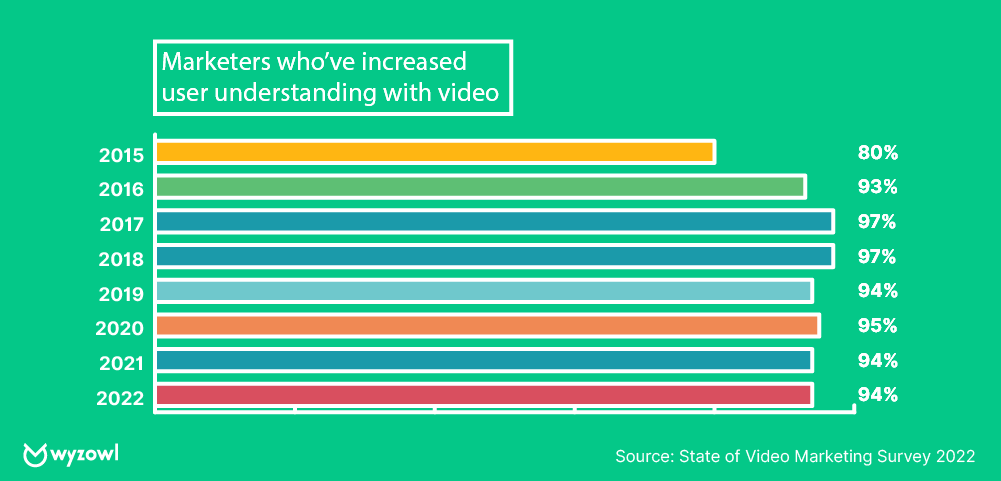 On measuring success, most marketers (62%) consider video engagement the top metric. Views or plays were a close second (61%).
On measuring success, most marketers (62%) consider video engagement the top metric. Views or plays were a close second (61%).
While only 27% of video marketers consider sales as a measurement of success, 81% report that video marketing has improved their company’s bottom line — meaning that videos will have a positive impact even if the focus remains on other metrics.
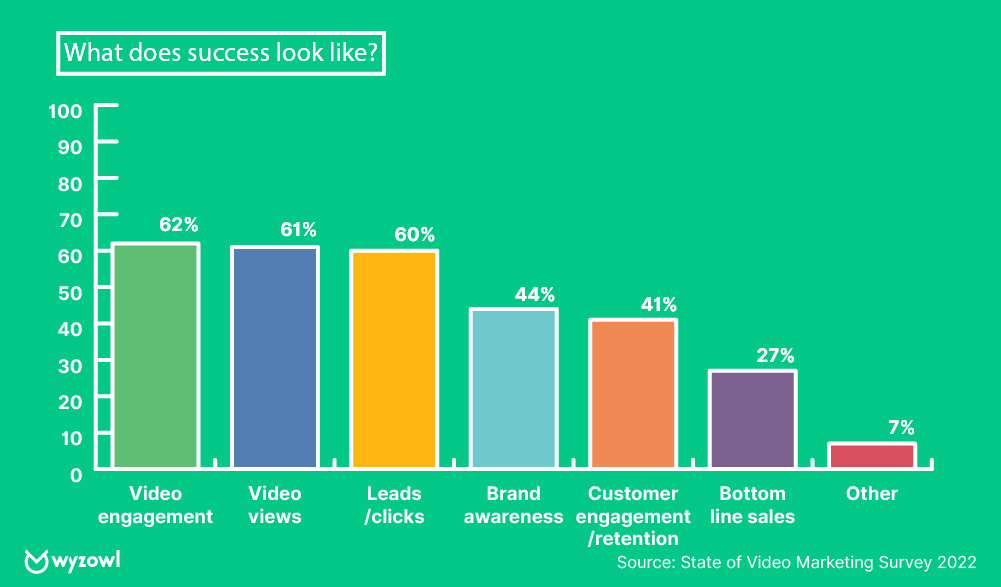 Pandemic Impact
Pandemic Impact
Unfortunately, 2021 was not the end of the pandemic – and it looks like COVID is likely to continue to make its impact felt in 2022.
So what impact is this having on the world of video marketing?
Well, 64% of marketers say the pandemic has affected their video marketing plans for 2021 and 2022. Out of these people, three-quarters said the pandemic made it more likely they would create video, and the other quarter said it made it less likely.
But, the good news is, the pandemic’s impact on video marketing budget seems to be diminishing.
In last year’s survey we asked marketers whether they expected their 2021 video marketing budget to be affected, and 63% said they thought it would be.
This year’s number – still high, at 50% – represents a considerable fall.
Looking Ahead
All the signs suggest that usage and spend are on course to continue their growth in 2022.
More than 99% of current video marketers told us they’ll continue using video in 2021, and two-thirds plan to increase or maintain their spend.
What’s more, from the people who told us they don’t currently use video, 79% told us they expect to start in 2022. (This is 10% higher than last year’s figure of 69% and 20% higher than the year before that.)
The net result of this is that we can all expect to see more noise and competition for audience attention in the coming 12 months.
Of course, while oversaturation is a challenge, it isn’t an insurmountable one. It simply raises the bar in terms of content quality. Your videos will need to be well-planned, and very well-executed.
The Big Opportunities for Video Marketing in 2022
You’d be forgiven for looking at these numbers and feeling that video might be on the verge of reaching saturation point. Most of the percentage data around usage, spend, and consumer opinion are in the 80s and 90s — where they’ve held, consistently, for a number of years.
But the good news is that there still seems to be underutilized opportunities for marketers to explore video.
It’s notable that audiences continue to watch more video. Our data suggests the amount of online video watched per week, per person, has almost doubled since 2018.
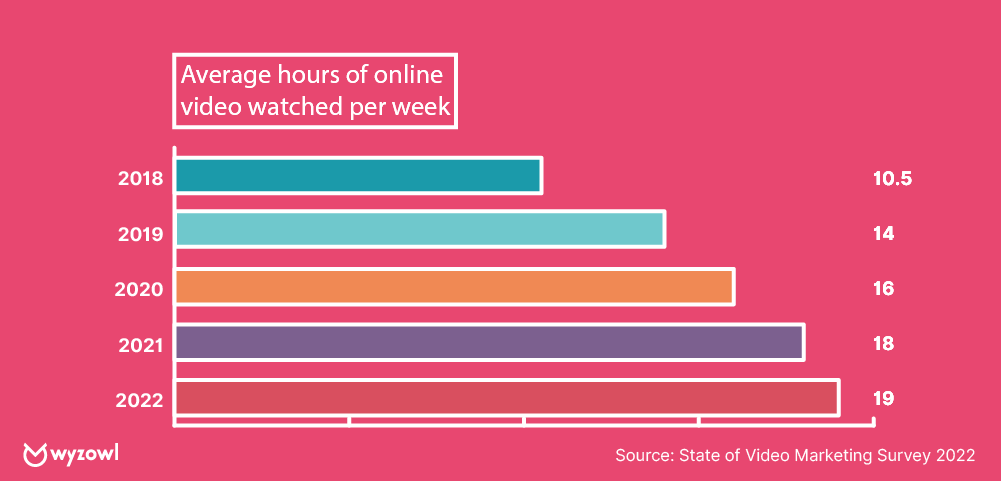 And what about where they watch it? Unsurprisingly, YouTube is the most widely-used platform among video marketers — used by 88%, with a considerable gap to the next widely-used.
And what about where they watch it? Unsurprisingly, YouTube is the most widely-used platform among video marketers — used by 88%, with a considerable gap to the next widely-used.
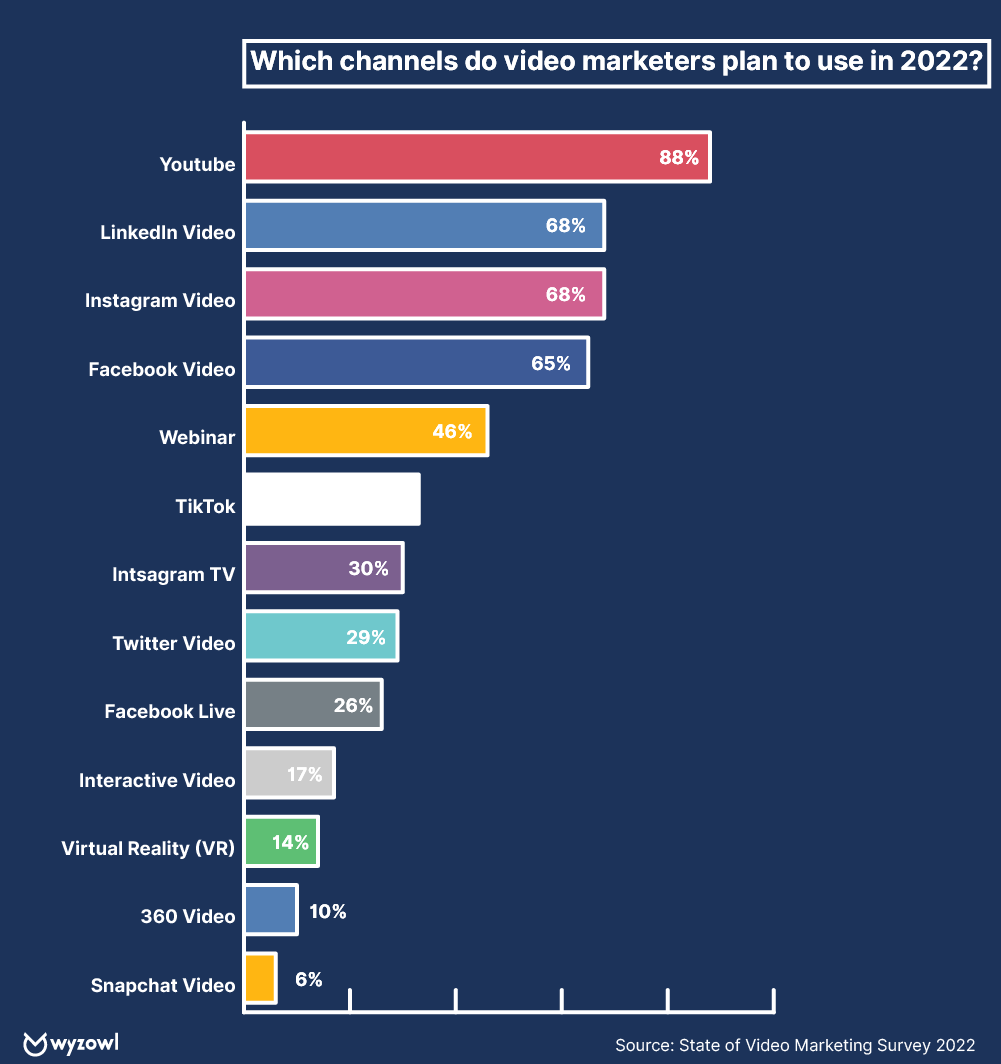 But some of the lesser-used video tactics also seem to reap real results for video marketers.
But some of the lesser-used video tactics also seem to reap real results for video marketers.
This year we asked people to tell us the purposes of the videos they’d created.
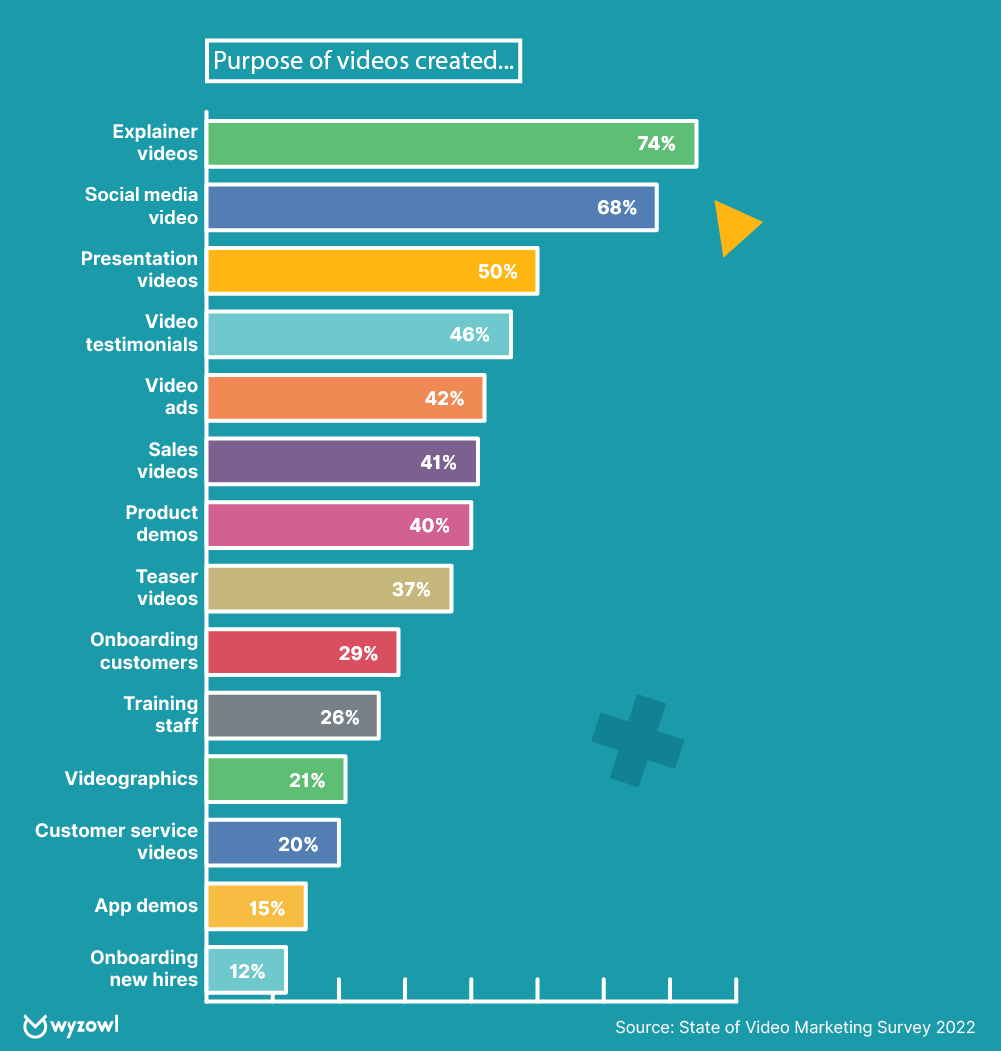 Explainer videos have seen tremendous success. As well as being the most common ‘goal’ of a marketing video, an overwhelming majority of people (96%) report watching explainer videos to learn more about a product, with 88% being swayed to make a purchase.
Explainer videos have seen tremendous success. As well as being the most common ‘goal’ of a marketing video, an overwhelming majority of people (96%) report watching explainer videos to learn more about a product, with 88% being swayed to make a purchase.
The product doesn’t have to be physical, either. 78% of people say they’ve been convinced to purchase an app or piece of software because of a video.
To Sum Up
The rise of video as a marketing tool seems inexorable.
Nearly nine out of ten people report wanting to see more videos from brands in 2021, making video an excellent tool for lead generation and brand awareness.
In many ways, with people spending more time at home – working remotely – the demand (and consumption) of video has accelerated.
Video looks set to continue its ten-year overnight success story into the coming decade. These stats paint a picture of a media type that’s almost universally popular among both marketers and their audiences, helping achieve a number of incredibly important goals.
You can check out the full report — with plenty more data points — and get a downloadable version by visiting Wyzowl’s State of Video Marketing 2022 page.
Editor’s note: This post was originally published in January 2018 and has been updated to reflect the latest data.
![]()


![→ Access Now: Video Marketing Starter Pack [Free Kit]](https://no-cache.hubspot.com/cta/default/53/8f27c677-d952-4663-8787-bf65c6a1ecf2.png)
